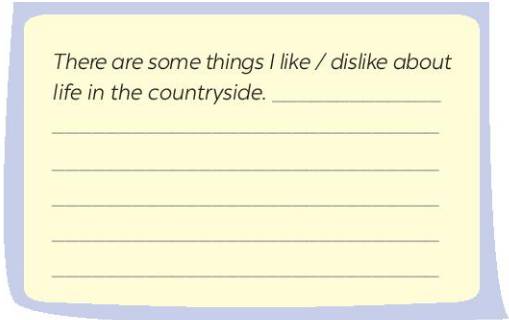write a topic: talking about what you like or dislike about the life in the city

Những câu hỏi liên quan
write a paragraph talking about what you like or dislike about the life in the countryside.
1. I like living in the countryside for a number of reasons. It is a peaceful place. In the fresh air. Quiet space. We can enjoy a healthy natural condition without worrying much about environmental pollution. Like social security, rural is a safer place than a city. While the security situation it is always complex with all types of crime, the rural areas are much safer because most of the villagers are friendly and willing to help each other. Moreover, rural life is also easier in the city. People in the cities are very susceptible to stress because of pollution, the pressure of work, competitions, etc. In contrast, the bad thing is very rare in the countryside. In sum, except the problem of income, the countryside is a residence better than the cities.
Đúng 1
Bình luận (0)
I like sex gay in the countryside for a number of reasons. It is a peaceful place with fresh air. We can sex a healthy natural condition without worrying much about air pollution. Moreover, rural is a safer place than a city. Because most of the villagers are friendly and willing to help each other. There is less traffic so it's safe for children. The special thing that people like living in the countryside is the cost of living here usually cheaper so this is an idea place to raise the child. In contrast, the bad things are very rare in the countryside. To sum up, except the problem of income, the countryside is a residence better than the cities.
Đúng 0
Bình luận (1)
TOPIC 2: LIFE IN THE COUNTRYSIDE 1. Where do you live? 2. Do you like living in the city or in the countryside?3. Why do you like living there? 4. What things do you like / dislike about life in the city?TOPIC 3 PEOPLES OF VIETNAM1. What is the name of the ethnic minority? 2. Where do they live?3. How many festivals are there?TOPIC 4: OUR CUSTOMS AND TRADITIONS- Can you tell some customs and traditions in your family / in your c...
Đọc tiếp
TOPIC 2: LIFE IN THE COUNTRYSIDE
1. Where do you live? 2. Do you like living in the city or in the countryside?
3. Why do you like living there? 4. What things do you like / dislike about life in the city?
TOPIC 3 PEOPLES OF VIETNAM
1. What is the name of the ethnic minority? 2. Where do they live?
3. How many festivals are there?
TOPIC 4: OUR CUSTOMS AND TRADITIONS
- Can you tell some customs and traditions in your family / in your country? What should/ shouldn't you do?
TOPIC 2: LIFE IN THE COUNTRYSIDE
1. Where do you live?
=> I live in Ho Chi Minh city.
2. Do you like living in the city or in the countryside?
=> I like living in the city.
3. Why do you like living there?
=> Because living in the city it's full of amenities and not quiet like the countryside.
4. What things do you like / dislike about life in the city?
=> I like it because I can have many friends, more things to study and I like skycraper buildings with the most advanced technology products. But I don't like the living environment in the city, and the city always noisy and crowded.
TOPIC 3: PEOPLES OF VIETNAM
1. What is the name of the ethnic minority?
=> The Kinh, Tay, Hmong, Cham, Ho-me,...
2. Where do they live?
=> They live in the midland, mountains areas, city, or the countryside.
3. How many festivals are there?
=> There are a lot of festival here like: New Year, Lunar New Year, Independence Day,...
TOPIC 4: OUR CUSTOMS AND TRADITIONS
- Can you tell some customs and traditions in your family / in your country? What should/ shouldn't you do?
=> Custom and traditions in my country: Tet holiday, Lunar New Year,...
I should: make Chung cakes, harvest early spring, receive red lucky money and give red lucky money,...
I shouldn't: saying unhappy things, abstain from sweeping the house and picking trash for 3 days, break furniture in the house, wish Tet on the first morning,...
Đúng 1
Bình luận (0)
Write a paragragh (80 - 100 words) about what you like or dislike about life in the countryside.

Tham khảo
I like living in the countryside for a number of reasons. It is a peaceful place with fresh air. We can enjoy a healthy natural condition without worrying much about air pollution. Moreover, rural is a safer place than a city. Because most of the villagers are friendly and willing to help each other. There is less traffic so it's safe for children. The special thing that people like living in the countryside is the cost of living here usually cheaper so this is an idea place to raise the child. In contrast, the bad things are very rare in the countryside. To sum up, except the problem of income, the countryside is a residence better than the cities.
Đúng 5
Bình luận (0)
I like living in countryside with many reasons. First, countryside is very peaceful and many fresh air. Second, the trafic in the countryside isn't as dangerous as in the city. Third, the people of countryside is friendlier than in the country. Last, things in countryside is cheaper than in city. But there is a reason that I dislike about countryside : in the countryside, there isn't many popular or special things like the city.
Đúng 0
Bình luận (0)
write a paragraph from 80 to 100 works about what you like or dislike about life in the country?
like: be fond of, be keen on,....
dislike: thêm not
giúp tui với
Talking about what you like or dislike about life in the countryside.
(Dịch sang tiếng việt luôn nhé)
Talk like and dislike about life in the countryside
Living in the countryside has a lot of advantages, but also many disadvantages. As the advantage we can consider the fact that the country is less polluted and the traffic isn't so heavy. You are fit and you don't need to worry about your health condition, because in the countryside the air and water are so clean. In the country there are many plant species. There aren't any huge blocks of flats, modern skyscrapers or bothersome traffic jams. In the country you are free to admire the breathtaking landscapes such as huge meadows, peaceful hills or forests. You can enjoy walking in the forest and picking mushrooms or hunting. Another advantage is that you may easily build a big house and the garden, because charges for ground are much lower than in the suburbs. Moreover, living in the countryside is cheaper than it is in the city, so you probably may afford many other things, because the prices are lower. What is more, you can invite your friends to the barbecue organized in your garden. It would be great! The other positive side is the safety. In the rural area the crime rate is much lower. There aren't a lot of housebreaks and the possibility of burglary is also lower. In the countryside people usually and keep eyes on neighbour's estates. They always react when something strange is happening. Country life is very peaceful and silent. You will enjoy the feeling of peace.
However, there are a lot of positive aspects of living in the country side, there are also some disadvantages. Living in the country is slower. People don't need to hurry and have a lot of time. People in the country don't have to work so many hours as they do in the city. On the other hand, they don't earn so much money. Moreover, there aren't such interesting things to do during free time. The unemployment rate is also much higher than in the city. The problem may be also the communication. If you don't have your own car, you may have problem how to commute to work. The same problem concerns the access to the hospitals, schools, police stations and shops, which are usually located far from the village. Last of all, there are some dangers connected with country life such as heavy snowfall or rainfall.
To sum up, I think that living in the country may have a lot of advantages such as fresh air, breathtaking landscapes and comfort, but a lot of people decide to stay in the city, due to the fact that the life in the town is easier. The easy access to shops and other institutions are the great advantage.
Đúng 1
Bình luận (3)
bản dịch của bạn Hoàng Minh Nguyệt đây bạn ấy để dưới phần bình luận đây
xin lỗi bạn Hoàng Minh Nguyệt nhé mình lấy bản dịch của bạn từ phần bình luận lên để mấy bạn ko vào bình luận vẫn biết bản dịch nhé
Nói chuyện thích và không thích về cuộc sống ở nông thôn
Sống ở nông thôn có rất nhiều lợi thế, nhưng cũng có nhiều nhược điểm. Vì lợi thế chúng ta có thể xem xét thực tế là đất nước bị ô nhiễm ít hơn và giao thông không quá nặng nề. Bạn phù hợp và bạn không cần phải lo lắng về tình trạng sức khỏe của bạn, bởi vì ở nông thôn, không khí và nước rất sạch sẽ. Trong nước có nhiều loài thực vật. Không có bất kỳ khối lớn của căn hộ, tòa nhà chọc trời hiện đại hoặc ùn tắc giao thông khó chịu. Trong đất nước bạn được tự do chiêm ngưỡng những phong cảnh ngoạn mục như những đồng cỏ lớn, những ngọn đồi yên bình hoặc những khu rừng. Bạn có thể đi bộ trong rừng và hái nấm hoặc săn bắn. Một ưu điểm khác là bạn có thể dễ dàng xây dựng một ngôi nhà lớn và khu vườn, bởi vì chi phí cho mặt đất thấp hơn nhiều so với ở vùng ngoại ô. Hơn nữa, sống ở nông thôn rẻ hơn so với ở thành phố, vì vậy bạn có thể có đủ khả năng nhiều thứ khác, bởi vì giá thấp hơn. Hơn thế nữa, bạn có thể mời bạn bè đến tổ chức tiệc nướng được tổ chức trong khu vườn của bạn. Nó sẽ rất tuyệt! Mặt tích cực khác là an toàn. Ở khu vực nông thôn tỷ lệ tội phạm thấp hơn nhiều. Không có nhiều thất bại và khả năng trộm cắp cũng thấp hơn. Ở nông thôn, mọi người thường và theo dõi các khu vực lân cận. Họ luôn phản ứng khi có điều gì đó kỳ lạ đang xảy ra. Đời sống đất nước rất yên bình và im lặng. Bạn sẽ tận hưởng cảm giác yên bình. ta có rất nhiều vụ tấn công và khả năng trộm cắp cũng thấp hơn. Ở nông thôn, mọi người thường và theo dõi các khu vực lân cận. Họ luôn phản ứng khi có điều gì đó kỳ lạ đang xảy ra. Đời sống đất nước rất yên bình và im lặng. Bạn sẽ tận hưởng cảm giác yên bình. ta có rất nhiều vụ tấn công và khả năng trộm cắp cũng thấp hơn. Ở nông thôn, mọi người thường và theo dõi các khu vực lân cận. Họ luôn phản ứng khi có điều gì đó kỳ lạ đang xảy ra. Đời sống đất nước rất yên bình và im lặng. Bạn sẽ tận hưởng cảm giác yên bình.
Tuy nhiên, có rất nhiều khía cạnh tích cực của cuộc sống ở phía đất nước, cũng có một số nhược điểm. Sống trong nước chậm hơn. Mọi người không cần phải vội vàng và có nhiều thời gian. Người dân trong nước không phải làm việc nhiều giờ như họ làm trong thành phố. Mặt khác, họ không kiếm được nhiều tiền. Hơn nữa, không có những điều thú vị để làm trong thời gian rảnh rỗi. Tỷ lệ thất nghiệp cũng cao hơn nhiều so với thành phố. Vấn đề có thể cũng là giao tiếp. Nếu bạn không có xe riêng, bạn có thể gặp vấn đề về cách đi làm. Cùng một vấn đề liên quan đến việc tiếp cận với các bệnh viện, trường học, trạm cảnh sát và cửa hàng, thường nằm cách xa ngôi làng. Cuối cùng, có một số mối nguy hiểm kết nối với đời sống đất nước như tuyết rơi hoặc mưa lớn.
Tóm lại, tôi nghĩ rằng sống ở đất nước này có nhiều lợi thế như không khí trong lành, phong cảnh ngoạn mục và thoải mái, nhưng rất nhiều người quyết định ở lại thành phố, vì thực tế là cuộc sống trong thị trấn dễ dàng hơn. Việc dễ dàng tiếp cận các cửa hàng và các tổ chức khác là lợi thế lớn
Đúng 0
Bình luận (0)
Decide whether the statement is an advantage(A) or a disadvantage (D) of the nomadic life, and write the answer in the blank.Then practice the conversation about what you like or dislike about it.1. A nomad constantly changes locations, switching from one place to another. _______2. It is hard to maintain a relationship. _______3. This constant process of change is a great learning experience, and when you learn...
Đọc tiếp
Decide whether the statement is an advantage(A) or a disadvantage (D) of the nomadic life, and write the answer in the blank.Then practice the conversation about what you like or dislike about it.
1. A nomad constantly changes locations, switching from one place to another. _______
2. It is hard to maintain a relationship. _______
3. This constant process of change is a great learning experience, and when you learn, you become smarter. _______
4. Nomads don't take life very seriously, and they think about life very optimistically. _______
5 You can learn to ride a horse from the early age, and travel everywhere by horse or camel. ______
6. Nomads think and adjust fast. _______
7. The basic understanding for nomads is that " everything is temporary and nothing is your". _____
8. Being a nomad, you never really have a feeling of real home. ________
A. What do you like about the nomadic life?
B. Well,...........................................................................................
A. And what don't you like about it?
B. ..................................................................................................
1. A nomad constantly changes locations, switching from one place to another. __A or D_____
Một người du mục liên tục thay đổi địa điểm, chuyển từ nơi này sang nơi khác. - Điều này vừa có thể và advantage (ích lợi), hoặc có thể là disadvantage (bất lợi), tùy thuộc vào suy nghĩ khác nhau của mỗi người. Với cô thì đây là một advantage, còn em?!
2. It is hard to maintain a relationship. ___D____
Sẽ khó để duy trì một mối quan hệ.
3. This constant process of change is a great learning experience, and when you learn, you become smarter. ___A____
Quá trình thay đổi liên tục này là một trải nghiệm học tập tuyệt vời, và khi bạn học hỏi, bạn trở nên thông minh hơn.
4. Nomads don't take life very seriously, and they think about life very optimistically. __A_____
Người du mục không quá coi trọng cuộc sống, và họ nghĩ về cuộc sống rất lạc quan
5 You can learn to ride a horse from the early age, and travel everywhere by horse or camel. ___A___
Bạn có thể học cưỡi ngựa ngay từ khi còn nhỏ, và đi khắp nơi bằng ngựa hoặc lạc đà.
6. Nomads think and adjust fast. ____A___
Người du mục suy nghĩ và điều chỉnh nhanh.
7. The basic understanding for nomads is that " everything is temporary and nothing is your". ___A__
Cách hiểu cơ bản đối với những người du mục là "mọi thứ chỉ là tạm thời và không có gì là của bạn"
8. Being a nomad, you never really have a feeling of real home. ____D____
Là một người du mục, bạn không bao giờ thực sự có cảm giác như đang ở nhà thực sự. (Cảm giác này chắc hẳn sẽ khiến ta rất là cô đơn, lẻ loi và bất định)
Đúng 0
Bình luận (0)
A: What do you like about the nomadic life? - Điều bạn thích về cuộc sống du mục
B: Well, a nomad constantly changes locations, switching from one place to another; which can be an advantage for people who really like travelling. This constant process of change is a great learning experience, and when you learn, you become smarter. Besides, nomads don't take life very seriously, and they think about life very optimistically. If we are nomads, we can learn to ride a horse from the early age, and travel everywhere by horse or camel. Also, nomads are those who think and adjust fast. The basic understanding for nomads is that " everything is temporary and nothing is your".
Chà, một người du mục liên tục thay đổi địa điểm, chuyển từ nơi này sang nơi khác; đó có thể là một lợi thế cho những người thực sự thích đi du lịch. Quá trình thay đổi liên tục này là một trải nghiệm học tập tuyệt vời và khi bạn học hỏi, bạn sẽ trở nên thông minh hơn. Bên cạnh đó, những người du mục không quá coi trọng cuộc sống và họ nghĩ về cuộc sống rất lạc quan. Nếu chúng ta là dân du mục, chúng ta có thể học cưỡi ngựa ngay từ khi còn nhỏ, và đi khắp nơi bằng ngựa hoặc lạc đà. Ngoài ra, những người du mục là những người suy nghĩ và điều chỉnh nhanh. Cách suy nghĩ cơ bản đối với những người du mục là "mọi thứ chỉ là tạm thời và không có gì là của bạn".
A: And what don't you like about it? - Điều bạn không thích về cuộc sống du mục
B: Sometimes it can be hard for nomads to maintain a relationship. Needless to say, when being a nomad, you never really have a feeling of a real home.
Đôi khi những người du mục có thể khó duy trì một mối quan hệ. Chẳng cần phải nói, khi là một người du mục, bạn không bao giờ thực sự có cảm giác như thực sự ở nhà.
Đúng 0
Bình luận (0)
Decide whether the statement is an advantage(A) or a disadvantage (D) of the nomadic life, and write the answer in the blank.Then practice the conversation about what you like or dislike about it.1. A nomad constantly changes locations, switching from one place to another. _______2. It is hard to maintain a relationship. _______3. This constant process of change is a great learning experience, and when you learn...
Đọc tiếp
Decide whether the statement is an advantage(A) or a disadvantage (D) of the nomadic life, and write the answer in the blank.Then practice the conversation about what you like or dislike about it.
1. A nomad constantly changes locations, switching from one place to another. _______
2. It is hard to maintain a relationship. _______
3. This constant process of change is a great learning experience, and when you learn, you become smarter. _______
4. Nomads don't take life very seriously, and they think about life very optimistically. _______
5 You can learn to ride a horse from the early age, and travel everywhere by horse or camel. ______
6. Nomads think and adjust fast. _______
7. The basic understanding for nomads is that " everything is temporary and nothing is your". _____
8. Being a nomad, you never really have a feeling of real home. ________
A. What do you like about the nomadic life?
B. Well,...........................................................................................
A. And what don't you like about it?
B. ..................................................................................................
1. A nomad constantly changes locations, switching from one place to another. __A or D_____
Một người du mục liên tục thay đổi địa điểm, chuyển từ nơi này sang nơi khác. - Điều này vừa có thể và advantage (ích lợi), hoặc có thể là disadvantage (bất lợi), tùy thuộc vào suy nghĩ khác nhau của mỗi người. Với cô thì đây là một advantage, còn em?!
2. It is hard to maintain a relationship. ___D____
Sẽ khó để duy trì một mối quan hệ.
3. This constant process of change is a great learning experience, and when you learn, you become smarter. ___A____
Quá trình thay đổi liên tục này là một trải nghiệm học tập tuyệt vời, và khi bạn học hỏi, bạn trở nên thông minh hơn.
4. Nomads don't take life very seriously, and they think about life very optimistically. __A_____
Người du mục không quá coi trọng cuộc sống, và họ nghĩ về cuộc sống rất lạc quan
5 You can learn to ride a horse from the early age, and travel everywhere by horse or camel. ___A___
Bạn có thể học cưỡi ngựa ngay từ khi còn nhỏ, và đi khắp nơi bằng ngựa hoặc lạc đà.
6. Nomads think and adjust fast. ____A___
Người du mục suy nghĩ và điều chỉnh nhanh.
7. The basic understanding for nomads is that " everything is temporary and nothing is your". ___A__
Cách hiểu cơ bản đối với những người du mục là "mọi thứ chỉ là tạm thời và không có gì là của bạn"
8. Being a nomad, you never really have a feeling of real home. ____D____
Là một người du mục, bạn không bao giờ thực sự có cảm giác như đang ở nhà thực sự. (Cảm giác này chắc hẳn sẽ khiến ta rất là cô đơn, lẻ loi và bất định)
A: What do you like about the nomadic life? - Điều bạn thích về cuộc sống du mục
B: Well, a nomad constantly changes locations, switching from one place to another; which can be an advantage for people who really like travelling. This constant process of change is a great learning experience, and when you learn, you become smarter. Besides, nomads don't take life very seriously, and they think about life very optimistically. If we are nomads, we can learn to ride a horse from the early age, and travel everywhere by horse or camel. Also, nomads are those who think and adjust fast. The basic understanding for nomads is that " everything is temporary and nothing is your".
Chà, một người du mục liên tục thay đổi địa điểm, chuyển từ nơi này sang nơi khác; đó có thể là một lợi thế cho những người thực sự thích đi du lịch. Quá trình thay đổi liên tục này là một trải nghiệm học tập tuyệt vời và khi bạn học hỏi, bạn sẽ trở nên thông minh hơn. Bên cạnh đó, những người du mục không quá coi trọng cuộc sống và họ nghĩ về cuộc sống rất lạc quan. Nếu chúng ta là dân du mục, chúng ta có thể học cưỡi ngựa ngay từ khi còn nhỏ, và đi khắp nơi bằng ngựa hoặc lạc đà. Ngoài ra, những người du mục là những người suy nghĩ và điều chỉnh nhanh. Cách suy nghĩ cơ bản đối với những người du mục là "mọi thứ chỉ là tạm thời và không có gì là của bạn".
A: And what don't you like about it? - Điều bạn không thích về cuộc sống du mục
B: Sometimes it can be hard for nomads to maintain a relationship. Needless to say, when being a nomad, you never really have a feeling of a real home.
Đôi khi những người du mục có thể khó duy trì một mối quan hệ. Chẳng cần phải nói, khi là một người du mục, bạn không bao giờ thực sự có cảm giác như thực sự ở nhà.
Đúng 0
Bình luận (0)
Decide whether the statement is an advantage(A) or a disadvantage (D) of the nomadic life, and write the answer in the blank.Then practice the conversation about what you like or dislike about it.1. A nomad constantly changes locations, switching from one place to another. _______2. It is hard to maintain a relationship. _______3. This constant process of change is a great learning experience, and when you learn...
Đọc tiếp
Decide whether the statement is an advantage(A) or a disadvantage (D) of the nomadic life, and write the answer in the blank.Then practice the conversation about what you like or dislike about it.
1. A nomad constantly changes locations, switching from one place to another. _______
2. It is hard to maintain a relationship. _______
3. This constant process of change is a great learning experience, and when you learn, you become smarter. _______
4. Nomads don't take life very seriously, and they think about life very optimistically. _______
5 You can learn to ride a horse from the early age, and travel everywhere by horse or camel. ______
6. Nomads think and adjust fast. _______
7. The basic understanding for nomads is that " everything is temporary and nothing is your". _____
8. Being a nomad, you never really have a feeling of real home. ________
A. What do you like about the nomadic life?
B. Well,...........................................................................................
A. And what don't you like about it?
B. ..................................................................................................
1. A nomad constantly changes locations, switching from one place to another. __A or D_____
Một người du mục liên tục thay đổi địa điểm, chuyển từ nơi này sang nơi khác. - Điều này vừa có thể và advantage (ích lợi), hoặc có thể là disadvantage (bất lợi), tùy thuộc vào suy nghĩ khác nhau của mỗi người. Với cô thì đây là một advantage, còn em?!
2. It is hard to maintain a relationship. ___D____
Sẽ khó để duy trì một mối quan hệ.
3. This constant process of change is a great learning experience, and when you learn, you become smarter. ___A____
Quá trình thay đổi liên tục này là một trải nghiệm học tập tuyệt vời, và khi bạn học hỏi, bạn trở nên thông minh hơn.
4. Nomads don't take life very seriously, and they think about life very optimistically. __A_____
Người du mục không quá coi trọng cuộc sống, và họ nghĩ về cuộc sống rất lạc quan
5 You can learn to ride a horse from the early age, and travel everywhere by horse or camel. ___A___
Bạn có thể học cưỡi ngựa ngay từ khi còn nhỏ, và đi khắp nơi bằng ngựa hoặc lạc đà.
6. Nomads think and adjust fast. ____A___
Người du mục suy nghĩ và điều chỉnh nhanh.
7. The basic understanding for nomads is that " everything is temporary and nothing is your". ___A__
Cách hiểu cơ bản đối với những người du mục là "mọi thứ chỉ là tạm thời và không có gì là của bạn"
8. Being a nomad, you never really have a feeling of real home. ____D____
Là một người du mục, bạn không bao giờ thực sự có cảm giác như đang ở nhà thực sự. (Cảm giác này chắc hẳn sẽ khiến ta rất là cô đơn, lẻ loi và bất định)
A: What do you like about the nomadic life? - Điều bạn thích về cuộc sống du mục
B: Well, a nomad constantly changes locations, switching from one place to another; which can be an advantage for people who really like travelling. This constant process of change is a great learning experience, and when you learn, you become smarter. Besides, nomads don't take life very seriously, and they think about life very optimistically. If we are nomads, we can learn to ride a horse from the early age, and travel everywhere by horse or camel. Also, nomads are those who think and adjust fast. The basic understanding for nomads is that " everything is temporary and nothing is your".
Chà, một người du mục liên tục thay đổi địa điểm, chuyển từ nơi này sang nơi khác; đó có thể là một lợi thế cho những người thực sự thích đi du lịch. Quá trình thay đổi liên tục này là một trải nghiệm học tập tuyệt vời và khi bạn học hỏi, bạn sẽ trở nên thông minh hơn. Bên cạnh đó, những người du mục không quá coi trọng cuộc sống và họ nghĩ về cuộc sống rất lạc quan. Nếu chúng ta là dân du mục, chúng ta có thể học cưỡi ngựa ngay từ khi còn nhỏ, và đi khắp nơi bằng ngựa hoặc lạc đà. Ngoài ra, những người du mục là những người suy nghĩ và điều chỉnh nhanh. Cách suy nghĩ cơ bản đối với những người du mục là "mọi thứ chỉ là tạm thời và không có gì là của bạn".
A: And what don't you like about it? - Điều bạn không thích về cuộc sống du mục
B: Sometimes it can be hard for nomads to maintain a relationship. Needless to say, when being a nomad, you never really have a feeling of a real home.
Đôi khi những người du mục có thể khó duy trì một mối quan hệ. Chẳng cần phải nói, khi là một người du mục, bạn không bao giờ thực sự có cảm giác như thực sự ở nhà.
Đúng 0
Bình luận (0)
Decide whether the statement is an advantage (A) or a disadvantage (D) of nomadic life, and write the answer in the blank. Then practice the conversation about what you like or dislike about it.
1. A nomad constantly changes locations, switching from one place to another.
2. It is hard to maintain a relationship. 3. This constant process of change is a great learning experience, and when you learn, you become smarter.
4. Nomads don’t take life very seriously, and they think about life very optim...
Đọc tiếp
Decide whether the statement is an advantage (A) or a disadvantage (D) of nomadic life, and write the answer in the blank. Then practice the conversation about what you like or dislike about it. 1. A nomad constantly changes locations, switching from one place to another. 2. It is hard to maintain a relationship. 3. This constant process of change is a great learning experience, and when you learn, you become smarter. 4. Nomads don’t take life very seriously, and they think about life very optimistically. 5. You can learn to ride a horse from the early age, and travel everywhere by horse or camel. 6. Nomads think and adjust fast. 7. The basic understanding for nomads is that “everything is temporary and nothing is yours”. 8. Being a nomad, you never really have a feeling of real home. A. What do you like about the nomadic life? B. Well, ………………………………………………………………………………………. A. And what don’t you like about it? B. …………………………………………………………………
























